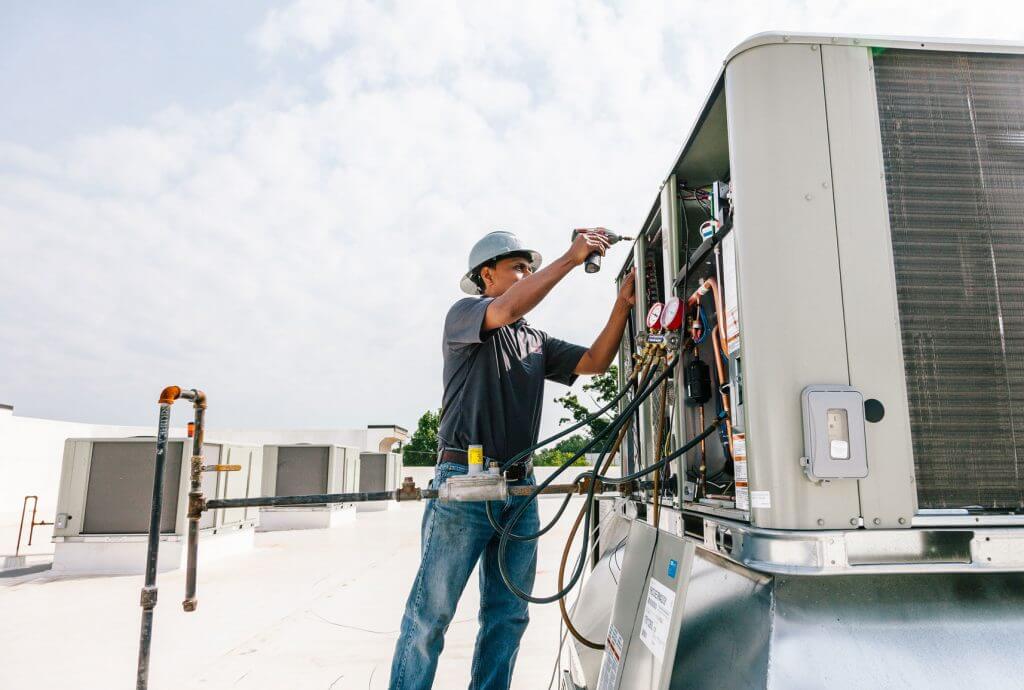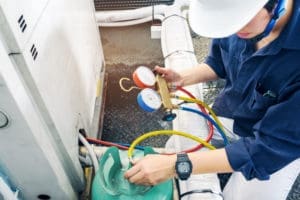Crucial Questions to Ask Your Air Conditioning Contractor in Brownwood TX
Crucial Questions to Ask Your Air Conditioning Contractor in Brownwood TX
Blog Article
Comprehending A/c: A Comprehensive Overview to Heating, Ventilation, and A/c Solutions
In today's quickly advancing globe, an essential understanding of cooling and heating systems is no more a luxury but a necessity for ensuring optimum interior settings. This overview uses a complete expedition of heating, air, and ventilation conditioning services, demystifying the complex interplay of components that govern comfort and performance. As we navigate through the details of selecting the right system and preserving it for peak performance, one starts to realize the profound impact these systems have on power usage and sustainability. What typical challenges could be threatening your HVAC system's potential without your understanding?
Basics of Cooling And Heating Solutions
Home Heating, Ventilation, and Air Conditioning (HVAC) systems are crucial parts in contemporary style, continually making sure ideal interior air high quality and thermal comfort. These systems are integral to preserving the wellness, efficiency, and health of residents in household, business, and industrial settings. At their core, HVAC systems are made to regulate the temperature level, humidity, and cleanliness of air, creating a comfortable environment no matter exterior weather.
The standard parts of a cooling and heating system consist of home heating devices, ventilation ducts, and air conditioning units. The heating component normally involves either a heat or a furnace pump, which warms up air to be distributed throughout the structure. Ventilation, a critical element of the system, includes the exchange of outdoor and indoor air, minimizing indoor pollutants and regulating moisture degrees. This process can be normally or mechanically helped with, often making use of fans and ductwork to disperse air efficiently.

Picking the Right HVAC System
Selecting a HVAC system entails a mindful equilibrium of suitability, price, and effectiveness to the certain needs of a building. It is necessary to consider the climate of the place, as this will certainly influence the kind of system that ideal maintains comfortable indoor temperature levels throughout the year.
Energy performance scores, such as SEER (Seasonal Energy Effectiveness Proportion) for air conditioning system and AFUE (Yearly Gas Application Effectiveness) for heating systems, are crucial factors when evaluating possible systems. Greater scores commonly suggest far better efficiency and lower operating prices gradually. Furthermore, possible buyers should compare ahead of time costs with possible long-lasting financial savings to determine the finest economic alternative.
Another vital consideration is the sort of system-- whether a centralized system, split system, or ductless mini-split is suitable. Each offers unique benefits and constraints, depending on setup complexity and room needs. Examination with cooling and heating specialists is advisable to make certain that the system chosen lines up with both the structure's specs and the residents' convenience choices.
Value of Normal Upkeep
Once the appropriate HVAC system is chosen and set up, keeping its effectiveness and durability ends up being a top priority. Regular upkeep is essential for guaranteeing that the system operates at peak performance, minimizing the threat of unexpected failures. Routine inspections and servicing can recognize potential concerns before they rise into costly fixings or replacements, consequently prolonging the lifespan of the tools.

Additionally, sticking to an upkeep routine can preserve the guarantee protection, as numerous producers call for evidence of regular maintenance to honor guarantee cases. Involving professional a/c professionals for routine maintenance makes certain that all elements are evaluated precisely and changed as required. This proactive approach not only safeguards the financial investment in the a/c system yet additionally advertises a much healthier indoor atmosphere for passengers, improving total health.
Enhancing Power Efficiency
To improve power effectiveness in a/c systems, it is critical to execute approaches that minimize energy intake while keeping optimum performance. One reliable approach is the integration of clever thermostats, which enable precise control over temperature level settings based on tenancy and time of day. These tools can learn patterns and adjust home heating and cooling timetables appropriately, decreasing unneeded energy use.
One more technique entails regular evaluation and cleaning my latest blog post of heating and cooling parts, such as air filters, coils, and ductwork. Tidy systems run much more efficiently, as dust and debris can block air flow and require the system to function harder, eating more energy. Guaranteeing appropriate insulation and securing is additionally vital, as it protects against energy loss and minimizes the tons on cooling and heating systems.
Furthermore, upgrading to energy-efficient devices, such as variable-speed motors and high-efficiency compressors, can considerably cut energy intake. These components change their speed and result to match the certain heating or cooling down demand, preventing power waste.
Spending in power recovery air flow systems can likewise improve performance by trading warm in between incoming and outgoing jet stream, minimizing the requirement for additional heating or cooling. By embracing these procedures, a/c systems can accomplish superior energy performance, leading to decreased operational costs and environmental influence.
Troubleshooting Common Issues
When addressing HVAC system malfunctions, an organized approach to fixing can properly identify and fix typical problems. The very first action includes inspecting the thermostat settings to guarantee they are proper and functioning. Often, dead batteries or inaccurate setups can trigger the system to act erratically. Next, examine the air filters. Filthy or clogged up filters restrict airflow, reducing system efficiency and might bring about getting too hot or cold.
Evaluate the circuit breakers and integrates; tripped breakers or blown merges can stop system operations. Furthermore, take a look at the outdoor unit for any blockages or particles that might hinder efficiency. Regular upkeep of these elements can prevent numerous typical issues.
Pay attention for uncommon noises, which might indicate mechanical problems such as worn-out belts or electric motor problems. Unusual rises in power expenses can additionally signal underlying inadequacies or leakages in ductwork. Make certain that all vents are open and unblocked to assist in optimal air flow.

Professional intervention ends up being necessary if these steps do not fix the issue, especially for complicated troubles like cooling agent leakages or electrical faults. Normal examinations and upkeep by qualified service technicians can preemptively attend to prospective concerns, ensuring the a/c system operates efficiently and reliably.

Final Thought
Finally, a detailed understanding of cooling and heating systems is crucial for ensuring ideal interior comfort and air top quality. By selecting the appropriate system based upon details structure requirements, the performance and sustainability of ventilation, air, and heating conditioning services can be made the most of. Routine upkeep is crucial for keeping system efficiency and durability, while power effectiveness can be considerably enhanced via notified practices. Attending to common issues with effective repairing more guarantees the reliable procedure of cooling and heating systems, profiting both property owners and services.
As we navigate through the intricacies of selecting the appropriate system and keeping it for peak efficiency, one begins to understand the useful reference extensive influence these systems have on energy consumption and sustainability.Home Heating, Ventilation, and Air Conditioning (HEATING AND COOLING) systems are pivotal elements in modern design, regularly guaranteeing optimal indoor air top quality and thermal convenience (Commercial HVAC contractor in Brownwood TX).Another vital factor to consider is the type of system-- whether a central system, split system, or ductless mini-split is ideal. Tidy systems run extra successfully, as dirt and particles can block airflow and compel the system to work harder, eating even more power.In conclusion, a detailed understanding of Cooling and heating systems is critical for guaranteeing optimum indoor convenience and air high quality
Report this page